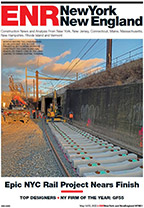Twenty-five states have filed 77 applications totaling more than $8.5 billion for the U.S. Dept. of Transportation's next round of high-speed-rail grants. Many applicants will be disappointed: DOT only has about $2.3 billion to distribute.

The department expects to announce the winners of the new round of grants "in early fall," says Rob Kulat, a spokesman with DOT's Federal Railroad Administration.
FRA did not have a list of applicants available. Based on reports from some, but not all, states, among the largest requests are from California, which is seeking $1.58 billion, and Florida, which is applying for $1.1 billion.
Another sizable request came from New Jersey, which is applying for $885 million.
The largest item for the Garden State is a replacement for the Portal Bridge over the Hackensack River on Amtrak's Northeast Corridor.
Odds of winning in round two are long, but not as daunting as in FRA's initial high-speed-rail grant competition, when the agency was inundated with $57 billion in applications for $8 billion in grants.
DOT officials announced the winners of that first round in January. Funding was provided in the 2009 American Recovery and Reinvestment Act.
For round two, states must contribute at least 20% of a project's total cost. There was no matching requirement in the first round of rail grants, but some winning states did provide their own money for projects or corridor plans.
The second-round money comes from DOT's regular 2010 appropriations. DOT has about $2.1 billion for rail corridor programs and $245 million for individual projects on which construction is ready to start.
For the new round, 10 states filed 20 applications valued at a combined $7.8 billion for corridor grants. Eighteen states submitted 57 applications totaling $700 million for specific rail projects.
New York is seeking $138.1 million for 10 projects.
The largest New York project is a $34.3-million request to design and build a fourth passenger-loading track at the Albany-Rensselaer station. New York is putting up $8.6 million of the project's $42.9-million total cost.
Other applicants include North Carolina, which is applying for $290 million.



